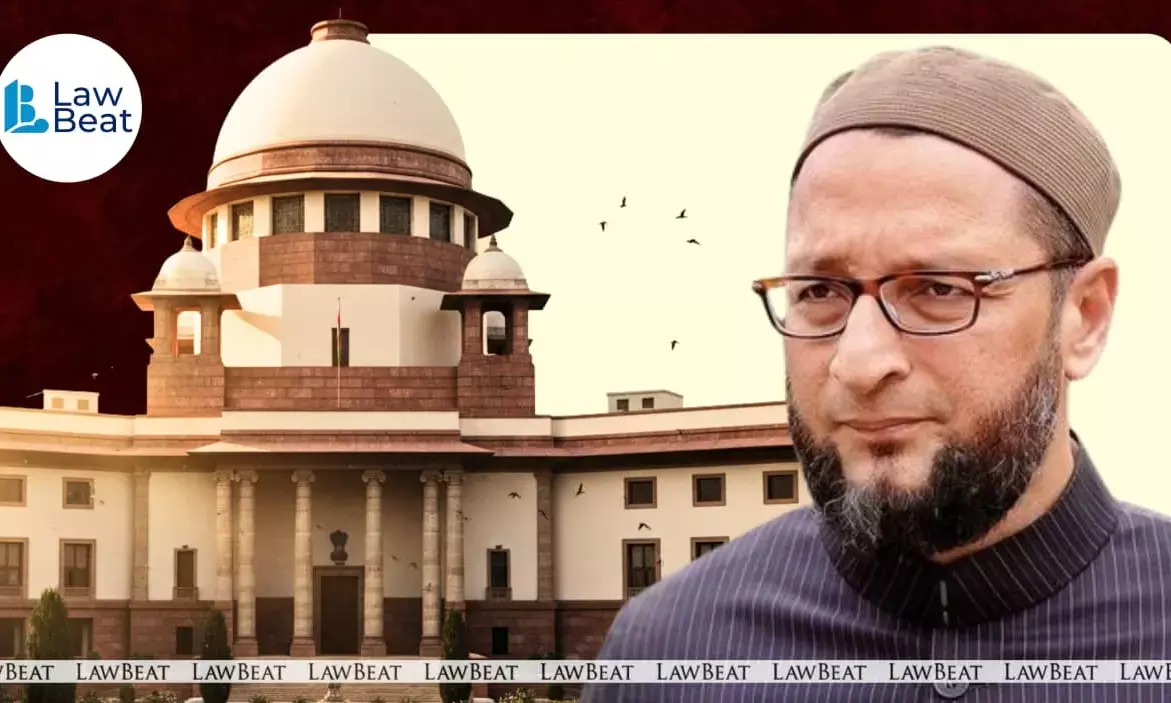SC Agrees to Hear Asaduddin Owaisi Plea Seeking Extension for Mandatory Registration of Waqf Properties

The Chief Justice of India noted that the matter would be listed
The Supreme Court on Monday, November 3, 2025, agreed to relist for hearing a plea filed by AIMIM chief Asaduddin Owaisi seeking an extension of time for the mandatory registration of all Waqf properties, including those categorised as ‘Waqf by user’, under the Centre’s UMEED portal.
The matter was earlier scheduled for hearing on October 28 but could not be taken up.
Appearing for Owaisi, Advocate Nizam Pasha mentioned the matter before a bench of Chief Justice of India B. R. Gavai and Justice K. Vinod Chandran, urging for urgent listing since the statutory deadline was approaching.
“We will give a date,” the CJI said, agreeing to take up the matter.
Previously, Pasha had informed the Bench that while the amended law provided six months for mandatory registration, five of those months had already elapsed since the Supreme Court’s interim order in September, leaving just one month remaining.
Notably, on September 15, the Apex Court had refused to stay the Waqf (Amendment) Act, 2025 in its entirety. "Presumption is always in favour of the constitutionality of the statute. Though entire Act is sought to be challenged..we have considered prima facie challenged to each of the sections and after hearing the parties that case was not made out to stay the statute.", CJI BR Gavai had observed. However, the CJI clarified that some provisions needed to be stayed till the relevant rules are framed by the Central government.
In May this year, the Supreme Court had reserved its order on interim relief in a batch of petitions challenging the constitutional validity of the Waqf (Amendment) Act, 2025, which, among other provisions, abolishes the concept of "waqf by user" and introduces sweeping changes to the registration and classification of waqf properties across India.
SG Mehta had told court that three days of hearings had revealed no ex-facie evidence of unconstitutionality. He cautioned that mere legal propositions or hypothetical arguments do not justify halting the operation of a law duly enacted by Parliament. With this, the Centre concluded its submissions before the Court.
The All India Muslim Personal Law Board, in a rejoinder had asserted that the recent legislative changes in the Waqf (Amendment) Act, 2025, infringe upon fundamental rights and were passed through a flawed parliamentary process. The Board argued that the Respondents’ defense, that the amendments do not affect essential religious practices, is legally untenable. It stated that compelling the Petitioners to undergo the “Essential Religious Practices” (ERP) test is not only constitutionally misplaced but also ignores the evolution of Indian constitutional jurisprudence.
Central Government had in April submitted a detailed preliminary affidavit before the Supreme Court, defending the constitutional validity of the Waqf (Amendment) Act, 2025, and opposing interim reliefs sought by petitioners challenging the law. The Centre had argued that the Waqf Amendment Act, 2025, was passed after extensive consultations, including the formation of a 31-member Joint Parliamentary Committee (JPC) comprising representatives from multiple political parties. The affidavit emphasizes that many of the petitioners had themselves participated in the JPC deliberations.
It is to be noted that on April 17, the Supreme Court had directed the Centre not to act upon the controversial provisions of the Act until further hearing, allowing State Governments and Waqf Boards to submit their responses. The Kerala State Waqf Board has also strongly opposed the Waqf (Amendment) Act, 2025, describing the newly enacted law as “unconstitutional,” “discriminatory,” and “subversive of secularism.”
Aam Aadmi Party (AAP) MLA and Chairman of the Delhi Waqf Board Amanatullah Khan on Saturday, 5 April, moved the Supreme Court of India challenging the constitutional validity of the Waqf (Amendment) Bill, 2025. All India Majlis-e-Ittehadul Muslimeen (AIMIM) Member of Parliament Asaduddin Owaisi also approached the Supreme Court challenging the bill. In his petition, Owaisi termed the Bill 'unconstitutional.'
Mentioning Date: November 3, 2025
Bench: CJI BR Gavai and Justice K. Vinod Chandran
